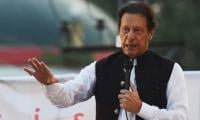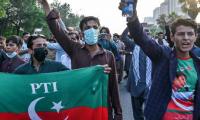PARIS: Donald Trump has not donned one. Emmanuel Macron boasted a small French flag on his. Slovakia´s president made a fashion statement by sporting a fuchsia-coloured one to match her outfit.
As the world starts emerging from coronavirus lockdowns, political leaders are being closely scrutinised over their choice to wear a mask -- or not -- as many people question seemingly mixed messages about the value of face coverings as infection barriers.
Many Western governments counselled against face masks for the general public at the start of the outbreak, which has now claimed more than a quarter of a million lives worldwide. But as people start returning to work despite the absence of a treatment or vaccine, masks are now being encouraged or even required as a critical anti-virus tool, along with hand washing and social distancing.
As government advice has changed, leaders have had to decide: to cover up or not? "The decision to wear or forgo a mask in public is based on what message the leader wants to convey," behavioural scientist Jacqueline Gollan of Northwestern University in Chicago, Illinois, told AFP.
"They are more likely to wear a mask if the leader believes in promoting public health. They may forgo the mask if the leader believes that they should convey that the risk of transmission is low and things are normalised," she said.
Some have started to appear in public in simple medical masks or more protective N95 or FFP2 masks, others are opting for the washable fabric ones that many governments are encouraging the public to wear.
But a handful, including US President Trump and Brazil´s leader Jair Bolsonaro, are bucking the trend and going about bare-faced. Whatever a leader's motivation, "it sets an example that many people will follow, whether that is to comply with or ignore the advice" on mask-wearing, said Claudia Pagliari, an eHealth researcher at the University of Edinburgh.
Over 50 countries now require people to cover their faces when they leave home, especially on public transport and in shops. But in many places, there are still not enough medical-grade masks to go around without eating into stocks needed to shield frontline doctors and nurses.
This has caused many -- more than three quarters in France according to a recent poll -- to suspect their governments lied about the efficacy of mask-wearing at the outset to avoid a run on stocks.
"Certainly public officials are guilty of thinking the public is... dumb and incapable of understanding a complex message," said Matthew Lesh, a public policy expert at the Adam Smith Institute in London.
"Therefore they simplify the message in order to get it across," in this case "a very simple message that masks don´t really work." KK Cheng, director of the Institute of Applied Health Research at Birmingham University, said politicians´ initial stance was largely based on the lack of clinical trials to prove that masks do work.
The World Health Organization also does not recommend compulsory mask-wearing by all. Governments "misunderstood, or haven't appreciated... the nature of evidence needed for an intervention like this," said Cheng, an early proponent of the role of masks in combating the epidemic who insists: "It´s simple physics."
A woman passes by a #COP29 sign during the United Nations climate change conference COP29 in Baku, Azerbaijan on...
Britain's Prime Minister Sir Keir Starmer attends a bilateral meeting with India’s Prime Minister Narendra Modi on...
An unidentified International Atomic Energy Agency inspector disconnects the connections between the twin cascades for...
Israeli troops near Hebron, in the Israeli-occupied West Bank, on November 29, 2022.— ReutersJENIN, Palestinian...
United State's national flag mounted on White House in Washinton DC. — AFP/FileWASHINGTON: Democrats and LGBTQ...
The launch of an Army Tactical Missile System by Ukraine into Russia. — Reuters/fileKYIV, Ukraine: Ukraine said on...







